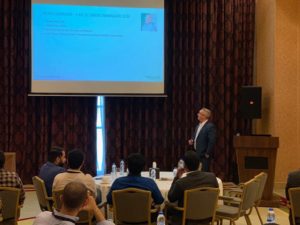The new ISO 16890 standard, and its contribution to molecular filtration in F&B, forms the basis of the event
DUBAI, UAE, 24 June 2019: Camfil Middle East on June 23 conducted a workshop in Dubai, where the focus was on the need for standardisation in filtration, in relation to the food and beverage (F&B) sector. Ross Dumigan, Food and Beverage Segment Manager, Camfil AB, said that the new ISO 16890 standard has a role to play in molecular filtration. Filters, he said, must be certified to ISO 16890 ePM1, ISO 846 – Microbial Growth Resistant, EC1935:2004 – suitable for food contact and to VDI 6022 – fully hygienic for HVAC Systems within the F&B Industry.

Camfil showcases filters at the workshop
Dumigan revealed that Camfil has been working with various organisations, such as European Food Safety Authority, the Food Standards Agency and NSF International, to achieve F&B-specific standardisation. Elaborating, he said that NSF International is an independent organisation dedicated to being a global provider of public health. It is also a safety-based risk management solution that serves the interests of all the stakeholders — namely the public, the business community and government agencies, he said. Dumigan then spoke on the use of filtration systems in turbomachinery. “Turbomachinery technology is a field that has evolved tremendously over the last decade,” Dumigan said. In-depth studies of thermodynamics, computerised fluid dynamics and the use of exotic materials and innovative technology have boosted the efficiency of equipment to a higher level, he said. However, all the developments have also made turbomachinery more susceptible to fine particulates that can cause fouling and corrosion — leading to rapid degradation in performance.

Ross Dumigan
The new requirement of filtration systems today, he asserted, is the need for higher efficiency. Camfil has always given importance to technology, he said, and the expansion of the Camfil laboratory, research centre, factory and high-bay warehouse is the latest in a series of major investments. “We now have four completely new labs – a particle lab, a molecular lab and an IAQ (Indoor Air Quality) lab,” he said. Today, he said, products and standards help building owners reduce their energy consumption and carbon footprint. At Camfil, he added, we believe that breathing clean air is a human right, and that’s why we offer a wide range of premium air solutions for commercial and for industrial air filtration and turbomachinery applications.
Copyright © 2006-2025 - CPI Industry. All rights reserved.